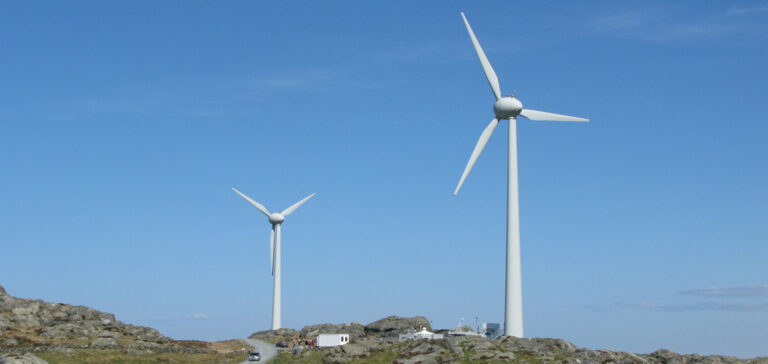Illegal wind turbines in Norway provoke environmental protest. This comes two years after a court ruling declared them illegal, giving hope to Sami reindeer herders. But these 151 turbines continue to operate, leaving us with a feeling of injustice.
The court decision in 2021
In October 2021, the Norwegian Supreme Court ruled that wind turbines built on the Fosen peninsula in western Norway violated the rights of the Sami, an indigenous population whose traditional lands were used for reindeer herding. The decision was seen as a victory for the Sami, but the wind turbine permits were not revoked, leaving the crucial question of their fate unresolved.
The Militant Manifestation
On Wednesday, hundreds of activists, some dressed in traditional Sami costume, blocked Oslo’s main thoroughfare. They set up a lavvo, a traditional Sami tent, to demand the demolition of the wind turbines and the return of the land. Some sat on the ground holding up a banner stating that “The right of indigenous peoples is not optional”.
Call to Action
Gina Gylver, president of the Norwegian branch of the NGO Friends of the Earth, called on Prime Minister Jonas Gahr Støre to act to put an end to this human rights violation. She stressed the need to respect the Norwegian Supreme Court’s decision and proceed with the dismantling of the wind turbines.
Since the court ruling in 2021, Sami activists have been organizing symbolic actions to make their voices heard. These actions, which last several days, have recently received the support of renowned Swedish activist Greta Thunberg, who joined the movement in February, on the 500th day since the court ruling.
The Importance of Conflict
The Norwegian government apologized to the Sami herder families and launched a mediation process to find a solution to the conflict. However, he did not react to the recent demonstration…
This dispute is of major importance, as it could set a precedent for other projects planned on the vast territories traditionally used by the Sami in Norway. This indigenous community, with around 100,000 members spread across Norway, Sweden, Finland and Russia, has long depended on fishing and semi-nomadic reindeer herding for its livelihood.
A Question of Justice and Ecology
Keeping wind turbines in operation on these indigenous lands raises essential questions about the rights of indigenous peoples and the preservation of their traditional way of life. It is crucial that the Norwegian government takes action to resolve this conflict and ensure respect for Sámi rights, while finding sustainable solutions for the coexistence of wind power and reindeer herding. This case highlights the need to reconcile environmental protection with the rights of indigenous peoples.
A global challenge
Wind turbines in Norway represent much more than just an environmental issue; they are the point of convergence for many issues linked to justice, ecology and the rights of indigenous peoples. The Norwegian government must assume its responsibilities by ensuring a fair resolution to this conflict, which is being closely watched by environmental groups, human rights organizations and the international community. This is not just a national issue, but a global one that highlights the importance of reconciling energy needs with the protection of indigenous rights and the environment.
Environmental and Sámi activists are protesting against the continued operation of wind turbines in Norway, two years after a court ruling declared them illegal. This case raises crucial questions about the rights of indigenous peoples and the balance between wind power and the preservation of the traditional Sami way of life in Norway.






















